DLGAP2
Disks large-associated protein 2 is a protein that in humans is encoded by the DLGAP2 gene.[5][6][7]
Function
The product of this gene is one of the membrane-associated guanylate kinases localized at postsynaptic density in neuronal cells. These kinases are a family of signaling molecules expressed at various submembrane domains and contain the PDZ, SH3 and the guanylate kinase domains. This protein may play a role in the molecular organization of synapses and in neuronal cell signaling. Alternatively spliced transcript variants encoding different isoforms have been identified, but their full-length nature is not known.[7]
Interactions
DLGAP2 has been shown to interact with DLG4, the canonical synapse marker protein, which in turn binds to N-Methyl-d-aspartate (NMDA) receptors and Shaker-type K+ channels.[8]
Clinical significance
As with many other synaptic genes, including its binding partner Shank2, DLGAP2 has been shown to be associated with Autism.[9]
References
- ENSG00000282152, ENSG00000282318, ENSG00000198010 GRCh38: Ensembl release 89: ENSG00000274161, ENSG00000282152, ENSG00000282318, ENSG00000198010 - Ensembl, May 2017
- GRCm38: Ensembl release 89: ENSMUSG00000047495 - Ensembl, May 2017
- "Human PubMed Reference:". National Center for Biotechnology Information, U.S. National Library of Medicine.
- "Mouse PubMed Reference:". National Center for Biotechnology Information, U.S. National Library of Medicine.
- Satoh K, Yanai H, Senda T, Kohu K, Nakamura T, Okumura N, Matsumine A, Kobayashi S, Toyoshima K, Akiyama T (Oct 1997). "DAP-1, a novel protein that interacts with the guanylate kinase-like domains of hDLG and PSD-95". Genes Cells. 2 (6): 415–24. doi:10.1046/j.1365-2443.1997.1310329.x. PMID 9286858.
- Ranta S, Zhang Y, Ross B, Takkunen E, Hirvasniemi A, de la Chapelle A, Gilliam TC, Lehesjoki AE (Sep 2000). "Positional cloning and characterisation of the human DLGAP2 gene and its exclusion in progressive epilepsy with mental retardation". Eur J Hum Genet. 8 (5): 381–4. doi:10.1038/sj.ejhg.5200440. PMID 10854099.
- "Entrez Gene: DLGAP2 discs, large (Drosophila) homolog-associated protein 2".
- Takeuchi M, Hata Y, Hirao K, Toyoda A, Irie M, Takai Y (1997). "SAPAPs. A family of PSD-95/SAP90-associated proteins localized at postsynaptic density". J. Biol. Chem. 272 (18): 11943–51. doi:10.1074/jbc.272.18.11943. PMID 9115257.
- Pinto D, Pagnamenta AT, Klei L, Anney R, Merico D, Regan R, et al. (2010). "Functional impact of global rare copy number variation in autism spectrum disorders". Nature. 466 (7304): 368–72. doi:10.1038/nature09146. PMC 3021798. PMID 20531469.
Further reading
- Takeuchi M, Hata Y, Hirao K, et al. (1997). "SAPAPs. A family of PSD-95/SAP90-associated proteins localized at postsynaptic density". J. Biol. Chem. 272 (18): 11943–51. doi:10.1074/jbc.272.18.11943. PMID 9115257.
- Naisbitt S, Kim E, Weinberg RJ, et al. (1997). "Characterization of guanylate kinase-associated protein, a postsynaptic density protein at excitatory synapses that interacts directly with postsynaptic density-95/synapse-associated protein 90". J. Neurosci. 17 (15): 5687–96. doi:10.1523/JNEUROSCI.17-15-05687.1997. PMID 9221768.
- Ranta S, Lehesjoki AE, de Fatima Bonaldo M, et al. (1997). "High-resolution mapping and transcript identification at the progressive epilepsy with mental retardation locus on chromosome 8p". Genome Res. 7 (9): 887–96. doi:10.1101/gr.7.9.887. PMID 9314494.
- Hirao K, Hata Y, Ide N, et al. (1998). "A novel multiple PDZ domain-containing molecule interacting with N-methyl-D-aspartate receptors and neuronal cell adhesion proteins". J. Biol. Chem. 273 (33): 21105–10. doi:10.1074/jbc.273.33.21105. PMID 9694864.
- Kawabe H, Hata Y, Takeuchi M, et al. (1999). "nArgBP2, a novel neural member of ponsin/ArgBP2/vinexin family that interacts with synapse-associated protein 90/postsynaptic density-95-associated protein (SAPAP)". J. Biol. Chem. 274 (43): 30914–8. doi:10.1074/jbc.274.43.30914. PMID 10521485.
- Hirao K, Hata Y, Deguchi M, et al. (2000). "Association of synapse-associated protein 90/ postsynaptic density-95-associated protein (SAPAP) with neurofilaments". Genes Cells. 5 (3): 203–10. doi:10.1046/j.1365-2443.2000.00318.x. PMID 10759891.
- Wang P, Zhang Q, Tochio H, et al. (2000). "Formation of a native-like beta-hairpin finger structure of a peptide from the extended PDZ domain of neuronal nitric oxide synthase in aqueous solution". Eur. J. Biochem. 267 (11): 3116–22. doi:10.1046/j.1432-1327.2000.01318.x. PMID 10824095.
- Bolliger MF, Frei K, Winterhalter KH, Gloor SM (2001). "Identification of a novel neuroligin in humans which binds to PSD-95 and has a widespread expression". Biochem. J. 356 (Pt 2): 581–8. doi:10.1042/0264-6021:3560581. PMC 1221872. PMID 11368788.
- Hu LA, Chen W, Premont RT, et al. (2002). "G protein-coupled receptor kinase 5 regulates beta 1-adrenergic receptor association with PSD-95". J. Biol. Chem. 277 (2): 1607–13. doi:10.1074/jbc.M107297200. PMID 11700307.
- Ohtakara K, Nishizawa M, Izawa I, et al. (2003). "Densin-180, a synaptic protein, links to PSD-95 through its direct interaction with MAGUIN-1". Genes Cells. 7 (11): 1149–60. doi:10.1046/j.1365-2443.2002.00589.x. PMID 12390249.
- Verhoeven K, De Jonghe P, Van de Putte T, et al. (2003). "Slowed conduction and thin myelination of peripheral nerves associated with mutant rho Guanine-nucleotide exchange factor 10". Am. J. Hum. Genet. 73 (4): 926–32. doi:10.1086/378159. PMC 1180612. PMID 14508709.
- Ying Z, Bingaman W, Najm IM (2004). "Increased numbers of coassembled PSD-95 to NMDA-receptor subunits NR2B and NR1 in human epileptic cortical dysplasia". Epilepsia. 45 (4): 314–21. doi:10.1111/j.0013-9580.2004.37703.x. PMID 15030493.




